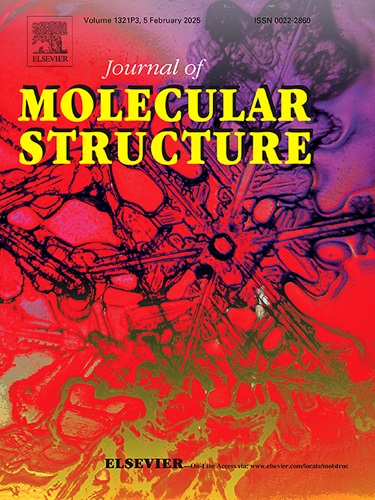热蒸发纳米级CdS薄膜的结构、形态、光学和纳米力学性能的比较分析
IF 4
2区 化学
Q2 CHEMISTRY, PHYSICAL
引用次数: 0
摘要
采用热蒸发法分别以1、5和10 Å/s的沉积速率在玻璃衬底上沉积了CdS纳米薄膜。采用x射线衍射(XRD)、原子力显微镜(AFM)、扫描电子显微镜(SEM)、能量色散x射线(EDX)、紫外可见分光光度计和纳米压痕等方法分析了CdS薄膜的结构、形貌、组成、光学和纳米力学性能。XRD衍射图表明,沉积的CdS薄膜具有偏向(002)面取向的六边形结构和接近化学计量的成分。测定了晶格常数、晶粒尺寸、缺陷密度、位错密度、晶格应变、单位表面晶数、层错等晶体结构参数。XRD结果表明,在1、5和10 Å/s沉积速率下,薄膜的晶粒尺寸、微应变和缺陷密度分别为20.4 ~ 14.7 nm、7.74 ~ 10.62和2.3 ~ 4.52 × 1011 lines/cm2。AFM图像表明,在1、5和10 Å/s沉积速率下,薄膜的rms表面粗糙度分别为2.73 nm、2.94 nm和3.18 nm。扫描电镜图像表明,薄膜均匀、连续、无缺陷。EDX检查显示,在1 Å/s的沉积速率下,薄膜几乎是化学计量的。光带隙在2.37 ~ 2.43 eV之间。纳米压痕试验评估了CdS薄膜的硬度、杨氏模量、蠕变行为和应变速率。在20-50µN负载下,当沉积速率为1、5和10 Å/s时,硬度分别为0.14-1.48 GPa、0.15-2.46 GPa和0.21-2.55 GPa。在70µN载荷下,杨氏模量降低了1-5 Å/s沉积速率,而几乎保持5-10 Å/s沉积速率不变。CdS薄膜的特性使其成为光伏、光电、热电和太阳能电池等应用的有利窗口层。本文章由计算机程序翻译,如有差异,请以英文原文为准。
Comparative analysis of thermally evaporated nanoscale CdS thin film's structural, morphological, optical and nanomechanical properties
CdS nanoscale thin films were deposited on glass substrates at 1, 5 and 10 Å/s deposition rates by thermal evaporation process. The structural, morphological, compositional, optical and nanomechanical properties of CdS thin films were analyzed by X-ray diffraction (XRD), atomic force microscopy (AFM), scanning electron microscopy (SEM), energy dispersive x-ray (EDX), UV-vis spectrophotometer and nanoindentation. XRD diffractogram indicate that the deposited CdS thin films have hexagonal structure with preferred orientation towards (002) plane and nearly stoichiometric composition. Various crystal structure parameters like lattice constant, crystallite size, defect density, dislocation density, lattice strain, number of crystallite per unit surface, stacking fault were determined. From XRD results, the calculated crystal structure parameters such as the crystallite size, microstrain and defect density were in the range of 20.4-14.7 nm, 7.74-10.62 and 2.3-4.52 × 1011 lines/cm2, at 1, 5 and 10 Å/s deposition rates, respectively .The AFM images indicated that the film's rms surface roughnesses were 2.73 nm, 2.94 nm and 3.18 nm at 1, 5 and 10 Å/s, respectively. The SEM images indicated that the films were uniform, continuous and defect free. The EDX examination revealed that at 1 Å/s deposition rate the film was nearly stoichiometic. The optical band gaps were determined to be in the range of 2.37-2.43 eV. Nanoindentation tests evaluated the hardness, Young's modulus, creep behavior and strain rate of CdS films. Hardness evaluated to be 0.14-1.48 GPa, 0.15-2.46 GPa, and 0.21-2.55 GPa at 1,5 and 10 Å/s deposition rate, respectively for 20-50 µN load. The Young's modulus decreases 1-5 Å/s deposition rate and becomes almost constant 5-10 Å/s deposition rate at 70 µN load. The characterization of CdS thin film recommend it as a favorable window layer in applications like photovoltaic, optoelectronic, thermoelectric and solar cells.
求助全文
通过发布文献求助,成功后即可免费获取论文全文。
去求助
来源期刊

Journal of Molecular Structure
化学-物理化学
CiteScore
7.10
自引率
15.80%
发文量
2384
审稿时长
45 days
期刊介绍:
The Journal of Molecular Structure is dedicated to the publication of full-length articles and review papers, providing important new structural information on all types of chemical species including:
• Stable and unstable molecules in all types of environments (vapour, molecular beam, liquid, solution, liquid crystal, solid state, matrix-isolated, surface-absorbed etc.)
• Chemical intermediates
• Molecules in excited states
• Biological molecules
• Polymers.
The methods used may include any combination of spectroscopic and non-spectroscopic techniques, for example:
• Infrared spectroscopy (mid, far, near)
• Raman spectroscopy and non-linear Raman methods (CARS, etc.)
• Electronic absorption spectroscopy
• Optical rotatory dispersion and circular dichroism
• Fluorescence and phosphorescence techniques
• Electron spectroscopies (PES, XPS), EXAFS, etc.
• Microwave spectroscopy
• Electron diffraction
• NMR and ESR spectroscopies
• Mössbauer spectroscopy
• X-ray crystallography
• Charge Density Analyses
• Computational Studies (supplementing experimental methods)
We encourage publications combining theoretical and experimental approaches. The structural insights gained by the studies should be correlated with the properties, activity and/ or reactivity of the molecule under investigation and the relevance of this molecule and its implications should be discussed.
 求助内容:
求助内容: 应助结果提醒方式:
应助结果提醒方式:


